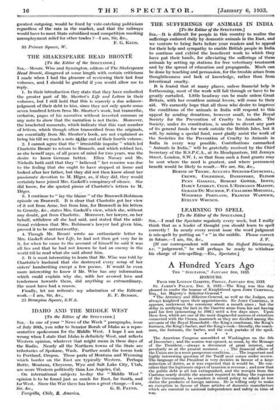THE SHAKESPEARE HEAD BRONTE
[To the Editor of the SPECTATOR.] SIR,—Messrs. Wise and Symington, editors of The Shakespeare Head &anti, disagreed at some length with certain criticisms I made when I had the pleasure of reviewing their last four volumes, and I should be grateful if you would allow me to reply.
1. In their introduction they state that they have embodied the greater part of Mr. Shorter's Life and Letters in their volumes, but I still hold that this is scarcely a due acknow- ledgment of their debt to him, since they not only quote some seven hundred letters from Mr. Shorter's work, but transcribe, verbatim, pages of his narrative without inverted IMMURES or any note to show that the narration is not theirs. Moreover, the bracketed numerals, which indicate that this vast number of letters, which though often transcribed from the originals, are essentially from Mr. Shorter's book, are not explained as being his till we reach a note isjalte end of their fourth volume.
2. I cannot agree that the" irresistible impulse" which led Charlotte Bronte to return to Brussels, and which robbed her, as she herself says, of all peace of mind for two years, was the desire to know German better. Ellen Nussey and Mr. Nicholls both said that they" believed "her remorse was due to the feeling that she ought to have stopped at home and looked after her father, but they did not then know about her passionate devotion to M. Heger, as, if they did, they would certainly have joined Mrs. GaskelPs conspiracy of silence. She did know, for she quoted pieces of Charlotte's letters to M. Heger.
3. I continue to" lay the blame" of the Branwell-Robinson episode on Branwell. It is clear that Charlotte got her view of it not from Anne, but from him, for Branwell in his letters to Grundy, &c., states Mrs. Gaskell's view, which she, without any doubt, got from Charlotte. Moreover, her lawyer, on her behalf, withdrew all she had said, and stated that the addi- tional evidence that Mrs. Robinson's lawyer had given him, proved it to be untrustworthy.
4. Though Mr. Bronte svrifie an enthusiastic letter to Mrs. Gaskell about her Life, he had not then got very far in it, for when he came to the account of himself he said it Was all lies and that he had not known he had an enemy in the world till he read what she said about him.
5. It is most interesting to learn that Mr. Wise was told by Charlotte's husband that she destroyed every scrap of her sisters' handwriting except a few poems. It would be even more interesting to know if Mr. Wise has any information which could explain why she, with her avowed love and tenderness towards them, did anything so extraordinary. She must have had a reason.
Finally, let me reiterate my admiration of the Editors'
work.—I am, Sir, &c., E. F. BENSON. 25 Brampton Square, S.W.3.




































 Previous page
Previous page